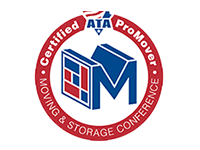Testimonials
You have been wonderful to work with. I was told you would be in contact with me during the move and you definitely kept the promise. It’s nice to know people meet and exceed expectations. Paul and I are happy with our experience and will definitely use you in the future should we move again.Thank you!
Compliments to Everyone!I am very satisfied with driver Barney and Al. My compliments to everyone
We are settled in, and have time to consider how easily the move was from Vonore, TN to Lansing, MI.The move not nearly as hectic as we thought it would be, this is in part due to the excellent performance by your people, namely Justin Schott the group leader. Justin had a handle on the entire move. Justin’s concerns were that the items be handled carefully and that they be placed where the client wanted them. Tim and Xavier are fine gentlemen, they too had the same concerns as Justin. Cody and Joe did their best to pack our goods so as to have little damage.The named are a credit to the Carey Moving Company. We are happy that we named you folks to do our transfer, thank you.
Pat-As mentioned we have not fully unpacked yet so hopefully all things are here. Other than that confirmation, the fellows who moved us were extremely courteous and mannerly. Much appreciated. They were very careful about not scratching the walls. They were also careful to ask where items should be placed. They arrived on time for delivery.
I would like the manager of the Arden office to know that the staff that handled our move into your storage facility was superb. Kim explained everything very clearly up front and there were no nasty surprises thereafter. Brian bossed the packing day and the loading day with ease and grace and I cannot tell you how relieved I was to know I was in good hands. The others, Lori, Doug, Tom, and Bob were also very good at what they do. Thank you. I look forward to delivery as soon as we find a place. Thank you.
I received my shipment on Sunday Feb 23rd. All items were in perfect shape. It was a great experience working with your company. Patrick was very helpful and knowledgeable. Being that I was in South Carolina for a very short time, he succeeded in getting everything set up in a timely manner to be packed and put on the truck. The packers were very nice and efficient and obviously packed items very well. The driver was thoughtful and called me several times to assure me that my items were on the way. He was friendly and efficient when he dropped off the boxes. You were very kind and helpful every time I called with a question and quickly handled all the paperwork.Please pass on our thanks and appreciation to all the people involved in the transport of our items.
Hi again!I need to tell you that I am very pleased with the move. All is great!The gentlemen, Barnie and Allen were absolutely terrific. Very pleasant,careful, patient and hard working.I will recommend Allied for sure!Thanks, LoriHendersonville, NC to Westwood, MAMary Daniels













